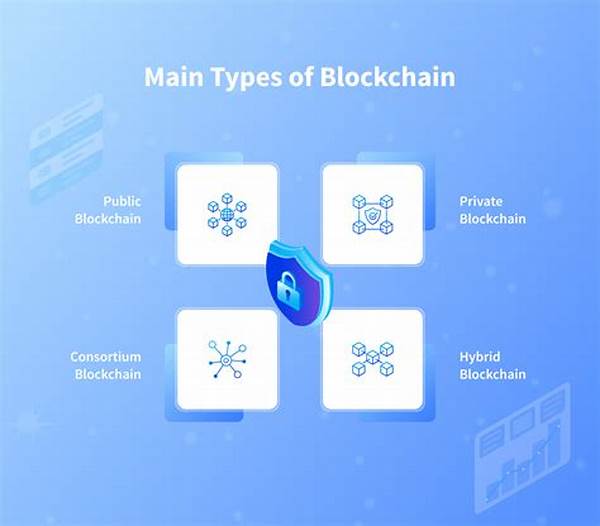In an era characterized by digital transformation, secure data exchange has become paramount. The proliferation of digital data necessitates innovative solutions for secure, transparent, and efficient information transfer. Blockchain technology, initially known for its role in cryptocurrency, has emerged as a pivotal solution for secure data exchange. Its decentralized nature and cryptographic security features make it ideal for safeguarding sensitive information across various industries. This article delves into the intricacies of utilizing blockchain for secure data exchange, highlighting its advantages and implementation across different sectors.
Read Now : Strategies For Better Feedback Mechanisms
The Role of Blockchain in Secure Data Exchange
Blockchain serves as a promising solution for secure data exchange by leveraging its immutable ledger system. This technology ensures that transactions recorded on the blockchain cannot be altered or tampered with, thereby maintaining data integrity. In secure data exchange, blockchain provides a robust mechanism for verifying and validating transactions in a trusted environment. Moreover, blockchain’s decentralized nature eliminates the need for intermediaries, thus reducing the risk of data breaches and unauthorized access. Companies that adopt blockchain solutions report enhanced transparency, security, and efficiency in data exchange processes, making blockchain a transformative technology in the digital economy.
Benefits of Secure Data Exchange with Blockchain
1. Enhanced Security: Blockchain utilizes cryptographic techniques to secure data, making unauthorized access nearly impossible. This assures stakeholders of the safety of their data during exchanges.
2. Transparency and Traceability: All transactions on a blockchain are recorded in a way that is transparent and traceable, allowing stakeholders to audit the exchange processes easily.
3. Decentralization: By eliminating central points of control, blockchain reduces vulnerabilities associated with data exchange infrastructure and enhances resilience.
4. Efficiency and Cost Reduction: Secure data exchange with blockchain minimizes the need for third-party verification, thus speeding up transactions and reducing costs.
5. Interoperability: Blockchain enables standardized protocols for data exchange across different platforms and systems, facilitating seamless integration and communication.
Challenges in Implementing Blockchain for Secure Data Exchange
While the promise of blockchain for secure data exchange is significant, its implementation does pose certain challenges. One of the primary hurdles is scalability. As more data is added to the blockchain, the system can become cumbersome, resulting in slower transaction times. This is particularly true in public blockchains, which are open to everyone and must ensure each transaction is validated by a majority of nodes. Additionally, the complexity of integrating blockchain into existing systems can be a deterrent for organizations with limited technical expertise. Nonetheless, ongoing research and development on optimizing blockchain scalability and interoperability suggest that these challenges may be mitigated over time. As such, businesses contemplating blockchain technology must weigh these potential drawbacks against the advantages of secure data exchange.
Read Now : Holistic Academic Evaluation Frameworks
Ensuring Compliance in Secure Data Exchange with Blockchain
To maximize its efficacy, blockchain technology in secure data exchange must adhere to regulatory and compliance standards pertinent to the industry in which it is deployed. For instance, in the healthcare sector, compliance with regulations such as HIPAA is essential to ensure data privacy and security. Blockchain can facilitate compliance by providing immutable records of data transactions, thereby offering a comprehensive audit trail. However, to fully leverage blockchain for regulatory compliance, organizations must ensure that their blockchain solutions are tailored to meet industry-specific legal requirements and data protection mandates.
Future Prospects for Secure Data Exchange with Blockchain
As organizations continue to digitize their operations, the relevance of secure data exchange with blockchain is set to increase. This technology promises not only enhanced security and transparency but also empowers businesses with the ability to innovate in their data management practices. Emerging trends such as smart contracts offer further possibilities for automating and securing transaction processes without human intervention. Moreover, advances in blockchain interoperability are likely to pave the way for more integrative solutions, enabling disparate systems to communicate efficiently. The trajectory of blockchain development indicates a bright future where data exchanges are not only secure but are conducted with unprecedented efficiency and transparency.
Integrating Blockchain with Existing Systems for Secure Data Exchange
Adapting current infrastructures to facilitate blockchain integration is often a complex task requiring meticulous planning and execution. Businesses must overcome the lack of general understanding and expertise in blockchain technology. Collaborative efforts involving blockchain specialists and current IT personnel are essential to ensure that the integration process is smooth and does not disrupt existing operations. Exploring hybrid models that blend blockchain technology with traditional systems might be a pragmatic approach. The secure data exchange resulting from such integration can provide businesses with a competitive edge, delivering peace of mind to stakeholders concerning data protection.
Conclusion
In conclusion, secure data exchange with blockchain represents a monumental shift in how data is managed in the digital age. Blockchain’s inherent qualities of security, transparency, and decentralization present compelling advantages over traditional data exchange methods. Though challenges exist, particularly concerning scalability and integration, the ongoing evolution of blockchain technology promises to address these barriers. As businesses navigate the complexities associated with data protection, blockchain technology stands out as a viable solution that is poised to redefine secure data exchanges.uanya
